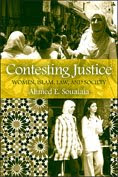by Ziad_B_2000
March 22, 2009: There has been a rise in the number of published books dealing with Islam. This work is a true paradigm shifter: it identifies the primary sources of the law, it disconnects the interpretations from the texts, it reviews recent scholarship, and provides new standards for dealing with social justice issues. Something else is refreshing about this work: the courage with which the author challenges both traditional Muslim scholars and Western intellectuals. I knew that I have in my hands an exceptional book when I read in the introduction declarations such as this one: "The Islamic civilization. undoubtedly had its achievements, its heroes, and its icons. But it also had its second-class citizens, its victims, its slaves, its cheap labor, its consumers, and its privileged elite." (pp. 7-8). The author, Ahmed Souaiaia, was not unrestricted by apologetics' rhetoric nor was he bashful in showing the complicity of the liberal West in maintaining authoritarian regimes for short term gains.
The author is clearly familiar with the complex debate of these issues and he enriches it thanks to his astounding proficiency in the languages of the original texts. He moves fluidly between the legal arguments and linguistic analyses to deconstruct the so-called precedents that limited women's property rights. Boldly, Souaiaia shows that the Qur'an protected women's inheritance rights but it was the elite who instituted a practice that is contrary to the explicit sanctions of the Qur'an.
Daringly, Souaiaia shows the role of many women in preserving a tradition that disadvantaged the weak. He challenges the theory that women's participation in the political and legislative processes would have eliminated discriminating against women by showing that in most cases, Muslim women were the strongest preservers of tradition and the most committed resisters of radical change.
Most original were the author's claims that Islamic law did not envision a system of brutal punishment; rather, exerted deterrence through what he calls communicative justice, which operated on the psychological and emotional levels to instill proper behavior. Also, the author beautifully applied the peculiar story of the Qur'an that links Moses to the "Knower" (khidr) to show the pervasiveness of religious morality among the "adherents" even in the face of what may be seen as unjust.
If I have to point out a weakness of this work, I would say its complexity. This work does not take a linear path to treat a single subject. Instead, it raises questions in the fields of ethics, jurisprudence, theology, and social behavior each of which could be treated in a book. But somehow, the author manages with extreme skill to show that all these paths lead to his findings. I don't think that this work could have stood out without that complexity; it is proof that not the theory (explanation) that is noteworthy; it is the method and approach that support such a theory that is at the foundation of original works. Contesting Justice is, without doubt, an original work; and Souaiaia is, without doubt, a scholar in valor.
Original review appeared on bn.com





No comments:
Post a Comment